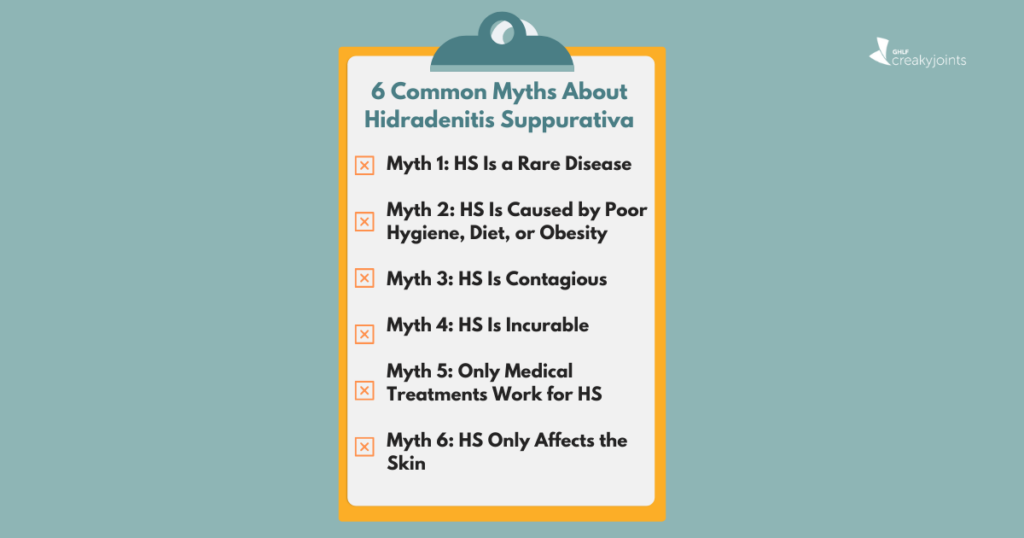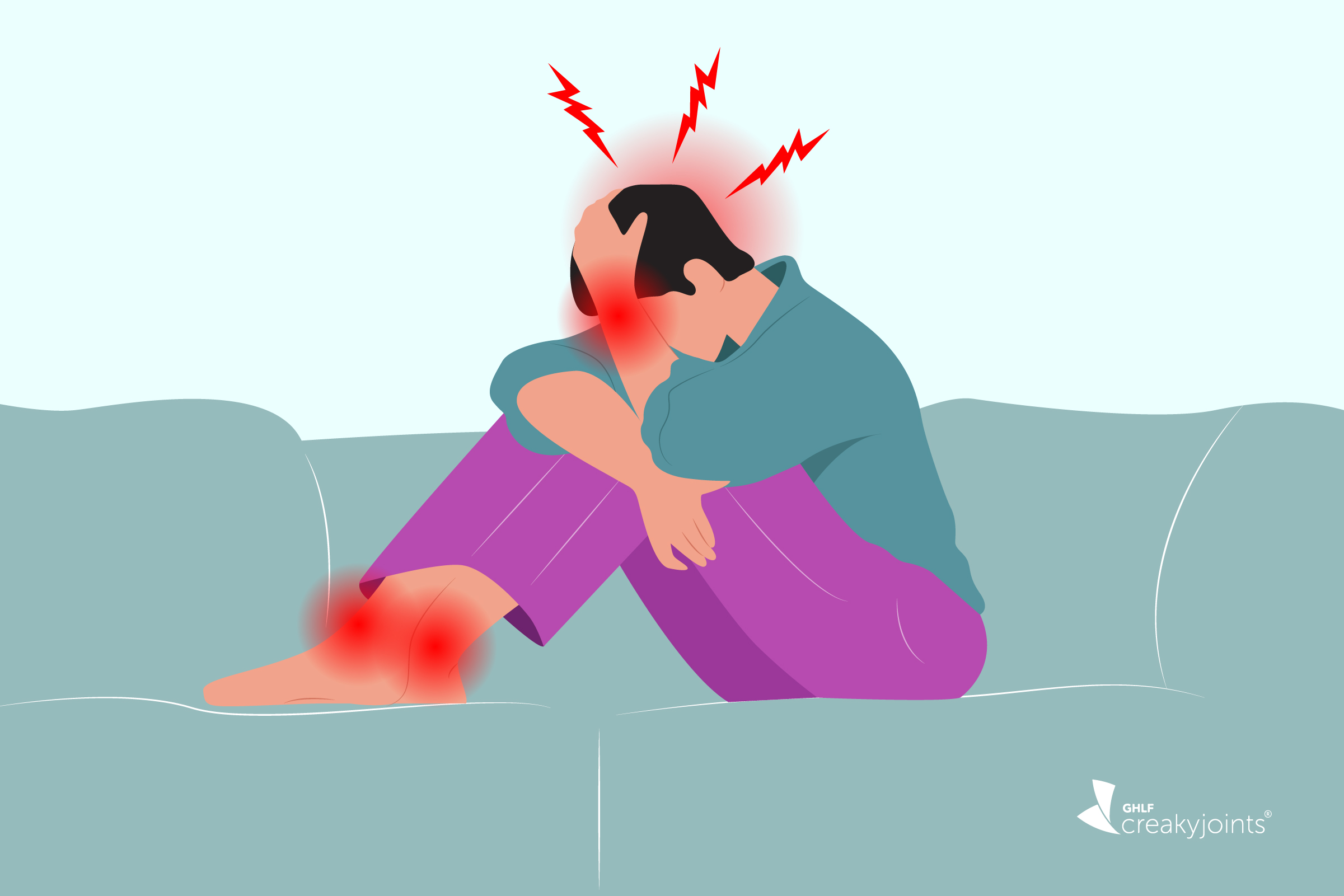Managing HS can be challenging, but there are many treatment options to explore, including traditional medications, surgery, and lifestyle changes.
6 Common Myths About Hidradenitis Suppurativa (HS) That May Harm Patients
6 Common Myths About Hidradenitis Suppurativa That May Harm Patients
Myths about hidradenitis suppurativa (HS) may be harmful to those who suspect they may have it or who are already living with it. Get the facts about this chronic skin condition.
June 6, 2024
Susan Jara

Pronouncing hidrandenitis suppurativa (hi-dray-deh-NYE-tis sup-yur-AH-tiv-uh, if you’re curious) isn’t the most challenging part of managing this chronic skin condition. HS is tricky to learn about because it’s not exactly a household name — not many people have heard about it, and misconceptions about who gets HS, its symptoms, treatment, and more can harm those who suspect they may have it or who are already living with it.
We talk to Aaron J Steen, MD, FACMS, FAAD, who is dual board-certified in Mohs Micrographic Surgery and General Dermatology by the American Board of Dermatology, to clear up some of the common myths about diagnosing, treating, and living with HS.
Myth 1: HS Is a Rare Disease
Fact: One out of every 100,000 people in the U.S. has been diagnosed with HS yet delays in diagnosis — the average time from symptom onset to diagnosis is 10 years — can make it difficult to know the precise prognosis.
“One of the most pervasive myths about HS is that it is a rare disease,” says Dr. Steen, noting that this myth is particularly dangerous because it can contribute to patients feeling isolated or ashamed of their disease. “The reality is that HS is fairly common and probably underdiagnosed.”
In fact, a quick search online reveals a large community of HS patients who share their experiences and support each other. “A word of caution,” he adds, “support groups can be the sources and amplifiers of myths about the disease, so it is important for HS patients to establish care with a trusted dermatologist.”
Myth 2: HS Is Caused by Poor Hygiene, Diet, or Obesity
Fact: This myth is common among patients and non-patients alike, say Dr. Steen. “I have had patients ask me if HS is due to poor hygiene, diet, or obesity. I suspect patients like to know why they have a disease because it might help them gain control over the disease.” However, HS is a complex condition influenced by a variety of factors — “genetics, hormones, body type, lifestyle, and luck all play a role in HS,” says Dr. Steen. “I personally do not believe HS or acne are diseases of poor hygiene, and overcleaning the skin can actually make both diseases worse.”
While lifestyle changes like weight loss and quitting smoking can help manage HS, they are not the root causes. Many patients require a combination of medications, surgery, and lifestyle adjustments to control the disease effectively.
Myth 3: HS Is Contagious
Fact: It is not a contagious disease; however, involvement of the groin and buttocks means that HS is sometimes confused for a sexually transmitted infection. “In reality HS cannot be transmitted from person to person — sexually or otherwise,” says Dr. Steen. “It is important to set the record straight on this point because myths like HS being contagious can increase patients’ feelings of depression, shame, and isolation.”
Myth 4: HS Is Incurable
Fact: While some patients do “outgrow” HS, it is a chronic disease and is not considered curable. “The goal of treatment is to stop the progression of the disease and limit the disease impact on patients’ quality of life,” says Dr. Steen.
With the right combination of lifestyle changes, medications, and surgical procedures, patients can manage HS, notes Dr. Steen, who breaks medical treatments into the following categories:
- Antibiotics: Typically a short-term intervention to help control flares; bacteria involved in HS flares can eventually become resistant, limiting the options for future flares. These can be either topical or oral medications.
- Anti-androgen (hormonal) treatments: Particularly helpful for women with HS; elevated levels of androgens can contribute to HS.
- Biologic therapies: A subtype of anti-inflammatory medications that have become the cornerstone of medical treatment for advanced HS. Tumor necrosis factor (TNF) and interleukins (e.g., IL-1, IL-12, IL-17A, and IL-17F) are examples of biologic therapy targets for HS treatment.
- Anti-inflammatory medications: The hallmark treatment for more advanced stage HS. Injections of cortisone can help calm down painful boils and inflamed cysts during simple flares. Oral steroids are reserved for severe flares.
Plus, new treatments are continually being developed, offering even more hope for effective management. “Even over the course of the past five years, new medications have become available that can dramatically improve HS patients’ quality of life,” says Dr. Steen.
Myth 5: Only Medical Treatments Work for HS
Fact: Dr. Steen highlights that HS is as much a surgical disease as a medical one. One surgical procedure he recommends to his patients is “deroofing,” which involves precise and selective surgical removal of HS scars and sinus tracts.
When successful, this procedure can “effectively cure a troublesome spot on a patient’s skin,” says Dr. Steen. However, he is careful to explain to patients that this does not remove the possibility of new HS lesions. “It does not cure the disease; only the treated spot,” he says.
For more extensively involved and scarred skin, plastic surgery may be used to remove a wider area of the skin and perform a skin graft. “Treatments like laser hair removal, zinc supplements, botulinum toxin injections, and retinoids might also be helpful,” says Dr. Steen.
Myth 6: HS Only Affects the Skin
Fact: HS impacts much more than just the skin. “There is pretty strong evidence that patients with HS are at elevated risk for depression, anxiety, and sleep disturbance,” says Dr. Steen, noting that this unrelated to disease severity, occurring in patients with mild cases. “The pain, drainage, and psychologic comorbidities also increase the likelihood of patients with HS missing work or school at an increased rate.” A study in the British Journal of Dermatology suggest high rates of medial and disability absenteeism for people with HS – on average, four more days off than those without the condition.
Additionally, people with HS are more likely to experience the following:
- Acne conglobata
- Inflammatory arthritis, including spondyloarthritis
- Inflammatory bowel disease
- Mental health disorders, major depressive disorder (MDD)
- Metabolic disorders (including metabolic syndrome and type 2 diabetes)
- Polycystic ovary syndrome
- Sexual dysfunction
- Substance use disorder (SUD)
“HS is a serious disease with wide ranging impacts on quality of life,” says Dr. Steen, “But there are great treatments available, both effective and safe, with new treatments becoming available all of the time.”
Your Interactive Patient Guide to Hidradenitis Suppurativa
Learning about hidradenitis suppurativa (HS) doesn’t have to be confusing or take hours of research. Use our free guide to make understanding your condition simpler, more efficient, and custom to your needs. Learn more.
Sources:
Interview with Aaron J Steen, MD, FACMS, FAAD.
Jfri A, et al. Prevalence of hidradenitis suppurativa: a systematic review and meta-regression analysis. JAMA Dermatol. 2021. doi: https://doi.org/10.1001/jamadermatol.2021.1677.
Garg A, et al. Evaluating patients’ unmet needs in hidradenitis suppurativa: results from the Global Survey Of Impact and Healthcare Needs (VOICE) Project. J Am Acad Dermatol. 2020. doi: https://doi.org/10.1016/j.jaad.2019.06.1301.
Kokolakis G, et al. Delayed diagnosis of hidradenitis suppurativa and its effect on patients and healthcare system. Dermatology. 2020. doi: https://doi.org/10.1159/000508787.
Schneider-Burrus S, et al. Features associated with quality of life impairment in hidradenitis suppurativa patients. Front Med (Lausanne). 2021. doi: https://doi.org/10.3389/fmed.2021.676241.
Tzellos T, et al. Impact of hidradenitis suppurativa on work loss, indirect costs and income. Br J Dermatol. 2018. doi: https://doi.org/10.1111/bjd.17101.
SUBSCRIBE TO GHLF
RELATED POST AND PAGES
_
Was this article helpful?
YesNo





